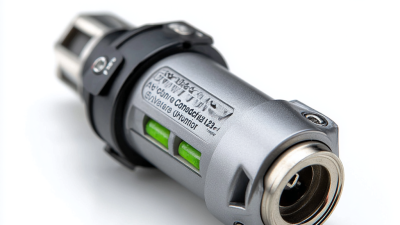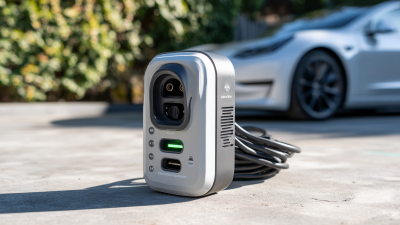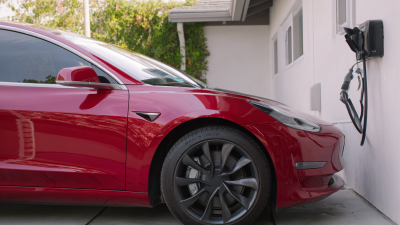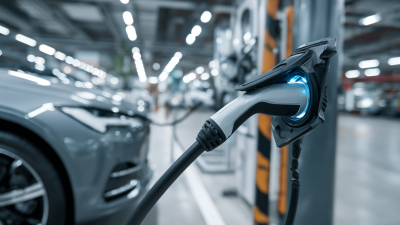As the adoption of electric vehicles (EVs) continues to surge, with a reported 5.6 million electric cars on the roads in the United States alone by the end of 2022 (U.S. Department of Energy), the need for a reliable and efficient Electric Car Charger for Home has never been more critical. According to a study by the International Energy Agency, the global stock of electric cars is projected to reach 145 million by 2030, highlighting the importance of accessible home charging solutions. Choosing the right charger is essential not only for optimizing charging times but also for ensuring safety and compatibility with your vehicle. With various options available, understanding the specifications, installation requirements, and long-term benefits of different types of chargers will empower EV owners to make informed decisions that enhance their driving experience while contributing to a more sustainable future.

When choosing the best electric car charger for your home,
it is vital to understand your specific charging needs. The rapid growth of the US electric vehicle charging
equipment market, projected to expand at an impressive CAGR of 23.99%,
underscores the rising demand for home charging solutions. This trend indicates that a significant number of
electric vehicle owners are opting for at-home charging options that can effectively cater to their daily
driving patterns, charging frequency, and the specific capabilities of their electric vehicles.
Charging your electric vehicle effectively requires an assessment of factors such as power output,
installation requirements, and compatibility with your vehicle model. Recent studies have shown that
the average electric vehicle can benefit from home-based charging that aligns with its battery capacity
and usage. Additionally, employing advanced solutions such as smart chargers
can optimize efficiency and reduce costs, ensuring that you maximize the range of your electric vehicle while
keeping energy consumption in check. Understanding these nuances will help you make informed decisions,
enabling a hassle-free and efficient charging experience at home.
When evaluating different types of electric car chargers, it’s crucial to understand the various options available for home use. The three primary types include Level 1, Level 2, and DC Fast Chargers. Level 1 chargers use a standard 120-volt outlet and typically take around 8 to 12 hours to fully charge an electric vehicle (EV). This option is ideal for those who can charge overnight and do not drive long distances daily. According to a report from the Electric Vehicle Infrastructure Deployment Coalition, around 80% of EV owners can manage their charging needs with Level 1 chargers.
On the other hand, Level 2 chargers operate at 240 volts and can significantly reduce charging time to approximately 4 to 6 hours for a full charge. They’re better suited for daily drivers or those who frequently take longer trips. The Department of Energy states that the installation of a Level 2 charger can increase home value and convenience. Additionally, DC Fast Chargers, typically found at public charging stations, can recharge an EV to 80% in just 30 minutes, making them less practical for home installations due to cost and infrastructure requirements.
**Tips:** When choosing a charger, consider your driving habits and home electrical capacity. Consulting with a professional can also help ensure you select the right charger type that aligns with your needs and local electrical codes, maximizing your EV's efficiency at home. Always check for potential rebates or incentives available in your area to lower the cost of installation.
| Charger Type | Charging Speed (miles per hour) | Power Output (kW) | Installation Type | Estimated Cost | Best For |
|---|---|---|---|---|---|
| Level 1 Charger | 3-5 miles | 1.4 kW | Standard Outlet | $300 - $600 | Low mileage drivers |
| Level 2 Charger | 12-60 miles | 3.7 - 22 kW | Dedicated Circuit | $500 - $2,000 | Daily commuters |
| DC Fast Charger | 60-100 miles | 50 - 350 kW | Commercial Stations | $10,000 - $40,000 | Long-distance travel |
| Portable Charger | 3-10 miles | 1.4 - 3.7 kW | Standard/Household Outlet | $200 - $800 | Traveling users |
| Smart Charger | 12-60 miles | 3.7 - 22 kW | Dedicated Circuit | $700 - $2,500 | Tech-savvy users |
When selecting the best electric car charger for home efficiency, it's essential to consider key features that enhance usability and performance. One of the most important aspects is the charging speed. Look for Level 2 chargers, which typically provide 240 volts, significantly reducing the time it takes to fully charge your vehicle compared to standard Level 1 chargers. Faster charging means less downtime and greater convenience, especially for daily drivers.
Another critical feature to examine is the compatibility with your electric vehicle. Ensure that the charger you choose supports the make and model of your car, including the correct connector type. Many chargers now come with universal compatibility, but confirming this detail can save you from future hassles.
*Tip:* Always check the installation requirements before purchasing. Some chargers might need additional electrical work, which can add to your overall cost. Additionally, consider smart features such as Wi-Fi connectivity, which allows you to monitor your charging sessions and receive updates via an app, optimizing your energy usage and enabling you to charge during off-peak hours.
*Tip:* Prioritize units with built-in safety features, like overcurrent protection and automatic shut-off capabilities, to ensure safe charging in your household.

When selecting an electric vehicle (EV) charger for home installation, several considerations come into play that can significantly impact both efficiency and convenience. Firstly, it's essential to evaluate your home's electrical system. Understanding the amperage capacity of your electrical panel will help determine if you need to upgrade your service or if a level 1 charger, which operates on standard home outlets, is sufficient. For quicker charging times, a level 2 charger, which requires a dedicated 240-volt outlet, might be necessary, necessitating professional installation.
Another key factor involves the designated installation location. Choose a site that allows for easy access to your vehicle while ensuring the charger is protected from the elements, such as rain and snow. Wall-mounted chargers can be ideal in garages, while outdoor installations require weather-resistant units. Additionally, consider cable management solutions to avoid tripping hazards and enhance the aesthetic appeal of your charging station. By prioritizing these installation considerations, you can create a functional and efficient home charging setup tailored to your specific electric vehicle needs.
When investing in an electric car charger for home use, maximizing charging efficiency is crucial to ensure that both time and energy are optimized. One key factor to consider is the charger’s power output. Chargers come in different levels, with Level 1 being the slowest and Level 2 providing faster charging capabilities. By selecting a Level 2 charger, homeowners can significantly reduce charging time, ensuring that their vehicle is ready to go without lengthy waits, especially after a long day.
Cost savings are another vital aspect of choosing the best electric car charger. Utilizing smart home technology can lead to further reductions in electricity expenses. Many modern chargers come equipped with scheduling features that allow users to take advantage of off-peak electricity rates, ultimately lowering costs. Additionally, implementing energy-efficient practices, such as charging during non-peak hours or utilizing solar power for charging, can lead to substantial savings over time. By considering these factors, homeowners can not only enhance their charging experience but also enjoy long-term financial benefits.















